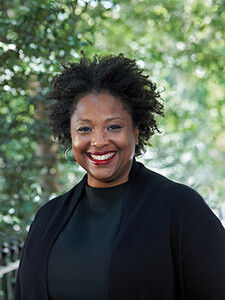Law School Alumni Tackle Voting Rights Challenges Nationwide

The 2020 election saw the highest voter turnout in the U.S in over a century, breaking records nationwide despite the ongoing COVID-19 pandemic. Yet since then, many states have either proposed or enacted legislation to make it more difficult for voters to vote.
According to the Brennan Center for Justice, at least 19 states have enacted 33 laws in 2021 affecting state voting laws. These laws make early voting and voting by mail more onerous, impose voter ID requirements, and increase the chance of people being removed from voting rolls.
Meanwhile, in Congress, the Freedom to Vote Act, currently before the U.S. Senate, includes national standards for voting and aims to prevent gerrymandering and would enact campaign finance reforms. The John R. Lewis Voting Rights Advancement Act, which has passed the House, would prevent voting rules that discriminate on the basis of race or ethnicity and would enhance voters’ ability to challenge discriminatory laws.
Yale Law School alumni have been at the forefront of some of the most recent urgent work surrounding voting rights issues. Below, four alumni discuss their efforts to expand voting rights through litigation, policymaking, scholarship, and more.
Deborah N. Archer ’96

Danielle Lang ’12

Allegra Lawrence-Hardy ’96

Nicholas Stephanopoulos ’06

Q: In our current moment, voting rights are under attack in many places. Based on your experience, what are the most critical challenges we face?
Deborah Archer: If the right to vote is the foundation of our democracy, we must acknowledge that the foundation of our democracy is crumbling. We are living through an avalanche of voter suppression efforts, on all fronts. We are also in the midst of redistricting based on the 2020 Census. For the last decade, state legislatures have been subject to extreme partisan distortion through gerrymandering, leading them to under-represent and disempower communities of color. The barriers and roadblocks to political participation that we have seen are an incredibly dangerous challenge to our democracy because they reflect the desire of some to hold onto power completely and indefinitely. Today, in many areas of civil rights and civil liberties, we are fighting a battle of ideas. But, our ideas about justice, equality, and inclusion will not mean anything if those who currently have and exercise disproportionate political power are able to use that power across the country to systemically disenfranchise people of color. Not only does it erect barriers to political participation, it will also have the effect of further discouraging people from participating in the political process. And that is how democracies die — when people believe they do not have any political power and worse when they may in fact be right.
Danielle Lang: As a voting rights advocate, I am concerned about challenges to our elections on two critical fronts: voting access and what the community has recently dubbed “election subversion,” i.e., the possibility that legitimate vote counts will not be respected. On the first front, the threat is not new, but it is intensifying. State legislatures introduced a record number of bills to restrict the right to vote this session and are facing enormous pressure from big money groups and ideological constituents alike to pass them. Legislators are attacking voting access from all sides, seeking to restrict voter registration, mail voting, in-person voting, and even get-out-the-vote activity such as the distribution of voter registration or absentee ballot applications. Meanwhile, the prevalent anti-voter and anti-democratic rhetoric in our politics has made the prospect of voter intimidation all too real, particularly for voters of color. This country has seen violent voter intimidation and we cannot be complacent about its potential return.
Allegra Lawrence-Hardy: Our communities are growing increasingly diverse — a change we should celebrate. Unfortunately, throughout our country’s history, the growth of diverse populations has been met with reactionary voter suppression laws, which have persistent discriminatory effects not easily nor quickly remedied. We are on a path to repeat that history. The growing Black and brown populations in our communities face a new wave of suppressive practices and election laws enacted by jurisdictions experiencing record turnout by voters of color. Without action, the anti-voter laws of today will burden Black and brown voters for generations, with discriminatory effects that long outlast the laws themselves.
Another critical challenge we face is the politicization of voting rights, which sows distrust and division within our communities. Voting rights are the admission ticket that opens the door to representative democracy and self-determination. At previous inflection points in our history, typically following a wave of suppressive voting practices like we are currently experiencing, leaders from across the political spectrum defended and expanded the franchise as a fundamental right. When President Lyndon Johnson signed into law the Voting Rights Act of 1965, he called it “one of the most monumental laws in the entire history of American freedom.”9 Since the VRA’s enactment in 1965, large bipartisan majorities have reauthorized the Act. We face another inflection point in our history, which brings an opportunity to protect and expand the franchise. The reduction of voting rights to a partisan issue threatens that opportunity.
Nicholas Stephanopoulos: We face a new and acute challenge as well as an old and chronic one. The new issue is the possibility of election subversion — candidates who received the most lawful votes being denied their offices because valid ballots were ignored or rejected on spurious grounds. Election subversion was attempted in 2020 and there are signs everywhere that it might be tried again, on a larger scale, in future elections. The old issue — which shows no signs of dissipating despite its age — is the misalignment of governmental outputs with popular preferences. Thanks to gerrymandering, legislatures’ partisan makeups often fail to reflect voters’ partisan choices. At every level, officeholders are more ideologically extreme than their constituents. And public policy as a whole is skewed toward the ideological fringes, the wealthy, and the status quo — and away from what most people want.
Q: How are you currently tackling issues surrounding voting rights?
Deborah Archer: Traditionally, civil rights advocates have framed it as a fight for access to our democracy, working to secure and protect access to our democratic system for all eligible voters, particularly Black people and other people of color. Since the founding of our democracy, Black voters and other voters of color have had to overcome relentless efforts to block us from casting our ballots. Challenging these barriers and roadblocks remains central to the work of the ACLU and other civil rights organizations. But, now the fight is also to protect our democracy. To shore up our democracy for everyone. Democracy is a threat to white supremacy. And so white supremacy is a threat to our democracy. Beyond defensive work and fighting back against the state-by-state systematic voter suppression efforts, we are exploring affirmative efforts to expand the franchise through ballot referenda and legislation. In the coming year, this work will also include advocacy in key states to ensure that the 2020 census results in fair state legislative and congressional maps.
Danielle Lang: As the director of Campaign Legal Center’s voting rights program, I am leading an integrated approach to tackling these challenges and ensuring equitable and meaningful access to the ballot for all Americans. Our voting rights program has an active docket of litigation across the country. We use both traditional and out-of-the-box legal tools to protect our democracy: from Section 2 of the Voting Rights Act challenges to strict voter ID laws to First Amendment challenges to restrictions on get-out-the-vote activity and procedural due process claims for voters seeking restoration of their rights. And going into the 2022 election cycle, our lawyers will be ready to jump into court at a moment’s notice when and if systems fail voters.
But in today’s climate, the courts cannot be our only answer to these challenges. CLC is developing and advocating for policy at the federal, state, and local levels to address the challenges of our time, including both traditional voter access issues and election subversions concerns. CLC has worked tirelessly to support the Freedom to Vote Act and the John Lewis Voting Rights Advancement Act while also fighting anti-voter legislation at the state level. Only by using every tool in our toolbox can we ensure a democracy that works and works equitably.
Allegra Lawrence-Hardy: As an attorney, I support and advise clients that prioritize voting rights within their value structure, and I work in and outside the courtroom to raise awareness about and combat unconstitutional and unlawful election practices. As an example, my law firm recently assisted in preparing a comprehensive report10 on Georgia’s history of discrimination in voting, submitted to the United States House and Senate Judiciary Committees in connection with congressional hearings on legislative reforms to the Voting Rights Act of 1965.
I also represent clients challenging suppressive and discriminatory voting practices through litigation. Fair Fight Action v. Raffensperger11 [challenges] Georgia election practices that unduly burden Georgians’ right to vote and disproportionately affect Black and brown voters.
Nicholas Stephanopoulos: I’ve been involved in the drafting of the For the People Act, the Freedom to Vote Act, and the John Lewis Voting Rights Advancement Act. If enacted (a big if), these bills would be monumental accomplishments on the order of the Voting Rights Act of 1965. I’m also playing a role in Harvard Law School’s new Election Law Clinic. The clinic’s mission is to identify promising academic theories and methods, and then to apply them to election law litigation. The clinic has an array of exciting ideas that will start to be unveiled soon. Stay tuned.
Q: Looking ahead, what are some solutions to secure voting rights and strengthen democracy in future elections?
Deborah Archer: Civil Rights advocates must work to hold our government accountable for ensuring that we all have the opportunity to register to vote and to freely and fairly participate in our democracy — ensuring equal access to the ballot, maximizing voter registration opportunities, and removing systemic barriers. I believe this starts with restoring the Voting Rights Act of 1965. But, our efforts cannot end there.
Danielle Lang: The good news is that there are solutions — a bevy of them — and those solutions are overwhelmingly supported by Americans. Congress has an important role to play here. First, Congress needs to pass both the Freedom to Vote Act and the John Lewis Voting Rights Advancement Act. The Freedom to Vote Act creates a federal baseline for access to the right to vote below which no state can go. And the solutions it offers — access to vote by mail for everyone, early voting, equitable polling place resources — are supported by 70 percent of Americans. Meanwhile, the John Lewis Act will restore the key provision of the VRA that was gutted by the Supreme Court in Shelby County v. Holder and stop new discriminatory voting provisions before they go into effect. Together, these two bills would advance a sea change in voting access in America. Second, Congress needs to address loopholes in the Electoral Count Act (ECA) so that future presidential candidates cannot attempt to subvert certified election results and avoid a repeat of the confusion and chaos of January 6, 2021. Once again, there is strong bipartisan support for reasonable and necessary updates to the ECA.
But even if Congress does not act, there is work to do at the state and local levels. Everyday Americans need to hold their legislators accountable for anti-voter legislation and push for commonsense modernization of their election systems. In recent years, we have seen tremendous progress on issues such as automatic voter registration and voting rights restoration. Voters have even used the ballot initiative process to push these reforms when stubborn legislators ignored their demands for a better democratic process.
Allegra Lawrence-Hardy: I hesitate to speak in terms of exhaustive solutions when it comes to safeguarding voting rights because, if history has taught us anything, it is that we will continue to face novel approaches to voter suppression and must therefore stay ever vigilant. With that said, there are strategies that can be immediately employed. For example, federal legislation would help establish minimum standards to protect the right to vote and create additional tools to challenge discriminatory voting policies and practices.
I also firmly believe that information is power for mobilizing around voting rights. So, I am thankful to Yale Law School for providing this opportunity to engage with students, staff, faculty, and alums and for creating a forum to share information I hope will empower the YLS community. Our younger population, especially, has the power and the motivation to strengthen our democracy, and I am most optimistic when I think about the progress to be made by the young leaders already working within our communities.
Nicholas Stephanopoulos: Federal legislation is by far the most potent solution, especially in an era when the courts tend to be obstacles to — not allies in — the effort to vindicate democratic values. In a single stroke, federal legislation could make voting easier, stop election subversion, end gerrymandering, and displace private with public campaign funding. Direct democracy (in states that allow it) and new legislation (in favorably inclined states) are also important pathways to election reform. Unfortunately, there’s no good legal or legislative option in a substantial number of states. Here, the only plausible strategy is the hard work of mobilization and advocacy — even in the face of policies aimed at denying and diluting the vote.
These responses have been edited for length.


